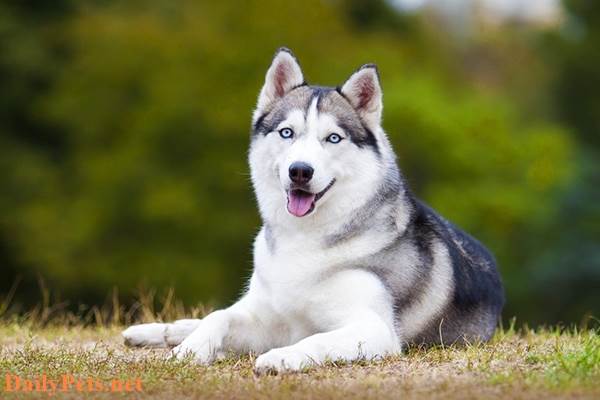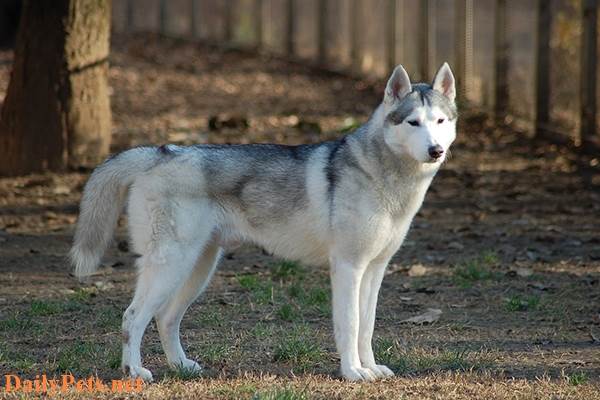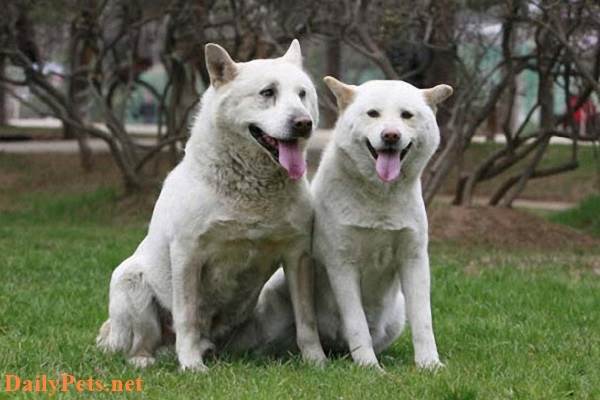If you are about to adopt a Siberian Husky, please join DailyPets.net to learn about this breed’s origin, characteristics, and care below.
Siberian Husky Origin
The Siberian Husky dog originates from the Northeast Siberia region of Russia, one of the very cold places. The Chukchi people bred the first Siberian Husky Dogs to create a working dog breed that could pull carts in harsh, cold weather conditions.

Siberian Husky Dog.
Classification of Siberian Husky Dogs
Siberian Husky dogs are divided into two types: purebred Siberian Husky dogs and hybrid Siberian Husky dogs.
Purebred Siberian Husky
Purebred Siberian Husky has parents of the same breed and is recognized by the American Kennel Club (AKC). Popular types of purebred Siberian Husky Dogs include Siberian Husky, Chinook, and Samoyed,…
Hybrid Siberian Husky
Hybrid Siberian Husky has a parent who is a purebred Siberian Husky dog crossed with other dog breeds or other animals such as foxes and wolves. Pet dog clubs do not recognize the Siberian Husky hybrid dog. Popular purebred Siberian Husky dogs include Pomsky, Huskita, Alusky,…
Popular Siberian Husky dog coat colors
The Siberian Husky has many different coat colors; the most common is white – black Siberian Husky, then brown (red) – white, gray (chalk) – white, white, and the rare coat color “agouti.”

Appearance characteristics of the Siberian Husky dog
The Siberian Husky dog has an elongated, strong, and toned body. The average height is from 53 to 58 cm, and weight is from 16 to 30 kg (usually, male Husky will have a slightly better body than females). This dog breed has a thick, two-layer coat to keep it warm (usually sheds twice a year).
The Siberian Husky’s nose is more special than other dog breeds because its nose color will match the color of its fur. Their noses are always a little wet. In cold weather, the Siberian Husky’s nose will turn brown or light pink, but its nose will have its original color in the summer.
Personality characteristics of Siberian Husky dogs
The Siberian Husky dog possesses almond-shaped eyes, slightly slanted towards the ends of the eyes, exuding a cold, wild look. However, they have quite gentle, friendly, and cute personalities. Siberian Husky do not tend to bark, but they howl a lot, which is how they communicate with their surroundings.
The average lifespan of a Siberian Husky dog is between 12 and 15 years.

How to Care for Siberian Husky Dogs
The Siberian Husky is a dog breed suitable for cold climates. If you have to live in a hot climate, the owner must be careful and take care of it properly; then, the Siberian Husky can adapt and develop normally.
The Siberian Husky is a working and commuting dog breed, so they love to walk and run outside. No matter how busy you are at work, you should spend 25-30 minutes a day getting your Siberian Husky to exercise. This will help the Siberian Husky release excess energy and limit the mess of furniture in your house.
Siberian Husky Dog Food
Since the Siberian Husky is descended from wolves, meat is their forte. You can choose meat and organ foods such as Beef, pork, heart, liver, kidney, lung, intestine, gizzard, brain, … to supplement nutrition for Siberian Husky. Besides, eggs are also considered a very good source of protein for them.
Even though they don’t like to eat vegetables, you must provide them with fiber. You can mix vegetables with meat or other Siberian Husky favorite foods so that they can easily eat. Note that cooked carrots should be processed before feeding the Siberian Husky.
You need carbs for your Siberian Husky to provide energy and help support healthy digestive function. Sometimes in the diet, you should add one of the types such as brown rice, white rice, wheat rice, …
Diet of Siberian Husky Dogs by Stage
The Siberian Husky’s diet is quite special because it directly affects their physical development and appearance. Not all ages eat the same; you need to plan and feed in the most moderation. So, the diet of the Siberian Husky is divided according to each age as follows:
Siberian Husky from 2 to 5 months old
At this time, the number of meals in the day should be divided into 4 meals/day. The amount of dog food in a meal should be moderate.
Siberian Husky from 5 to 12 months old
The number of meals of the Siberian Husky should be reduced from 4 to 3 meals/day. The amount of food can be increased compared to before (depending on the strength of the Siberian Husky Dog)
Siberian Husky dogs over 12 months old
Siberian Husky dogs in adulthood only need to maintain 2 meals/day with a larger amount of food/meal (note not to make the Siberian Husky too full)
How to care and hygiene for Siberian Husky Dogs
In addition to ensuring the space is cool and clean, you should also brush them regularly to remove loose hair and need to bathe them 1-2 times a month. When bathing, you must use a special shampoo for pets.
Common Siberian Husky Health Problems
Siberian Husky dogs often have gastrointestinal diseases, often caused by eating contaminated or contaminated food or water, and hip dysplasia, showing that the inner and outer joints of the dog will develop when infected. unusual, progressive eye diseases of cataracts, corneal dystrophy, and retinal atrophy.
Notes when taking care of Siberian Husky
It should be noted that the necessary nutrition for Siberian Husky Dogs depends on their age and stage.
Note a reasonable exercise regimen for Siberian Husky Dogs. Spend about 30 minutes a day for the Siberian Husky to exercise, play comfortably, and, importantly, release excess energy in the body.
One of the things you need to know when caring for Siberian Husky Dogs is the diseases they often have and learn the causes, symptoms, and prevention to help Siberian Husky Dogs develop to the fullest.
Siberian Husky Dogs need to see a doctor immediately if they show signs of illness. It is important to take them for regular vaccinations to prevent rabies.
Siberian Husky price
The price of a Siberian Husky puppy can vary widely depending on various factors such as the breeder’s reputation, location, pedigree, and whether the puppy is intended for show, breeding, or pet purposes.
On average, you might expect to pay anywhere from $600 – $2000 for a Siberian Husky puppy from a reputable breeder.
With Siberian Husky dogs imported from European countries or Canada and America. Among them, especially those imported from Russia – the homeland of the Siberian Husky breed, will have the highest price. The price range from $2000-$4000 is for Huskies with popular coat colors of black and gray. As for dogs with rare fur colors, the price can be up to $5,000.
The number of Husky dogs imported from Russia is not much because Russia has a policy of restricting the export of Husky dogs with the aim of preserving the precious genetic species.
Regarding the quality of these Husky dogs, you can be completely assured. They often have much superior health + appearance. You will also be provided with import papers + pedigree, and certificates from FCI or AKC dog breed associations when purchasing.





